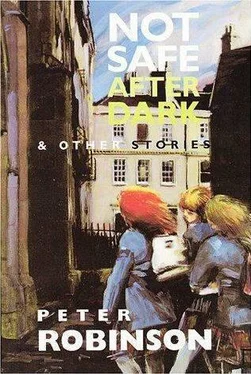A fighter droned overhead. I watched it dip and spin through the blue air and wished I could be up there. I’d always regretted not being a pilot in the war. A barge full of soldiers drifted by, and I moved aside on the towpath to let the horse that was pulling it pass by. For my troubles I got a full blast of sweaty horseflesh and a pile of steaming manure at my feet. That had even Ezekiel Woodruff beat.
Aimlessly I followed the direction Ezekiel had told me Johnny had walked in – towards the city centre. As I walked, Jack Blackwell’s scornful words about my inability to find Johnny echoed in my mind. Book learning . That was exactly the kind of cheap insult you would expect from a moron like Jack Blackwell, but it hurt nonetheless. No sense telling him I’d been buried in the mud under the bodies of my comrades for two days. No sense telling him about the young German soldier I’d surprised and bayoneted to death, twisting the blade until it snapped and broke off inside him. Jack Blackwell was too young to have seen action in the last war, but if there was any justice in the world, he’d damn well see it in this one.
The canal ran by the back of the train station, where I crossed the narrow bridge and walked through the crowds of evacuees out front to City Square. Mary Critchley’s anguish reverberated in my mind, too: ‘ Mr Bashcombe! Mr Bashcombe! ’ I heard her call.
Then, all of a sudden, as I looked at the black facade of the post office and the statue of the Black Prince in the centre of City Square, it hit me. I thought I knew what had happened to Johnny Critchley, but first I had to go back to the street and ask just one important question.
•
It was late morning. The station smelt of damp soot and warm oil. Crowds of children thronged around trying to find out where they were supposed to go. They wore name tags and carried little cardboard boxes. Adults with clipboards, for the most part temporarily unemployed schoolteachers and local volunteers, directed them to the right queue, and their names were ticked off as they boarded the carriages.
Despite being neither an evacuated child nor a supervisor, I managed to buy a ticket and ended up sharing a compartment with a rather severe-looking woman in a brown uniform I didn’t recognize, and a male civilian with a brush moustache and a lot of Brylcreem on his hair. They seemed to be in charge of several young children, also in the compartment, who couldn’t sit still. I could hardly blame them. They were going to the alien countryside, to live with strangers, far away from their parents, for only God knew how long, and the idea scared them half to death.
The buttoned cushions were warm and the air in the carriage still and close, despite the open window. When we finally set off, the motion stirred up a breeze, which helped a little. On the wall opposite me was a poster of the Scarborough seafront, and I spent most of the journey remembering the carefree childhood holidays I had enjoyed there with my parents in the early years of the century: another world, another time. The rest of the trip I glanced out of the window, beyond the scum-scabbed canal, and saw the urban industrial landscape drift by: back gardens, where some people had put in Anderson shelters half-covered with earth to grow vegetables on; the dark mass of the town hall clock tower behind the city centre buildings; a factory yard, where several men were loading heavy crates onto a lorry, flushed and sweating in the heat.
Then we were in the countryside, where the smells of grass, hay and manure displaced the reek of the city. I saw small, squat farms, drystone walls, sheep and cattle grazing. Soon train tracks and canal diverged. We went through a long noisy tunnel, and the children whimpered. Later, I was surprised to see so many army convoys winding along the narrow roads, and the one big aerodrome we passed seemed buzzing with activity.
All in all, the journey took a little over two hours. Only about ten or eleven children were shepherded off at the small country station, and I followed as they were met and taken to the village hall, where the men and women who were to care for them waited. It was more civilized than some of the evacuation systems I’d heard about, which sounded more like the slave markets of old, where farmers waited on the platforms to pick out the strong lads, and local dignitaries whisked away the nicely dressed boys and girls.
I went up to the volunteer in charge, an attractive young country woman in a simple blue frock with a white lace collar and a belt around her slim waist, and asked her if she had any record of an evacuee called John, or Johnny, Critchley. She checked her records then shook her head, as I knew she would. If I were right, Johnny wouldn’t be here under his own name. I explained my problem to the woman, who told me her name was Phyllis Rigby. She had a yellow ribbon in her long wavy hair and smelled of fresh apples. ‘I don’t see how anything like that could have happened,’ Phyllis said. ‘We’ve been very meticulous. But there again, things have been a little chaotic.’ She frowned in thought for a moment, then she delegated her present duties to another volunteer.
‘Come on,’ she said, ‘I’ll help you go from house to house. There weren’t that many evacuees, you know. Far fewer than we expected.’
I nodded. I’d heard how a lot of parents weren’t bothering to evacuate their children. ‘They can’t see anything happening yet,’ I said. ‘Just you wait. After the first air raid you’ll have so many you won’t have room for them all.’
Phyllis smiled. ‘The poor things. It must be such an upheaval for them.’
‘Indeed.’
I took deep, welcome breaths of country air as Phyllis and I set out from the village hall to visit the families listed on her clipboard. There were perhaps a couple of hundred houses, and less than fifty per cent had received evacuees. Even so, we worked up quite a sweat calling at them all. Or I did, rather, as sweating didn’t seem to be in Phyllis’s nature. We chatted as we went, me telling her about my school teaching, and she telling me about her husband, Thomas, training as a fighter pilot in the RAF. After an hour or so with no luck, we stopped in at her cottage for a refreshing cup of tea, then we were off again.
At last, late in the afternoon, we struck gold.
•
Mr and Mrs Douglas, who were billeting Johnny Critchley, seemed a very pleasant couple, and they were sad to hear that they could not keep him with them for a while longer. I explained everything to them and assured them that they would get someone else as soon as we had the whole business sorted out.
‘He’s not here,’ Johnny said as we walked with Phyllis to the station. ‘I’ve looked everywhere, but I couldn’t find him.’
I shook my head. ‘Sorry, Johnny. You know your mum’s got a speech impediment. That was why I had to go back and ask her exactly what she said to you before I came here. She said she told you your father was missing in action, which, the way it came out, sounded like missing in Acksham , didn’t it? That’s why you came here, wasn’t it, to look for your father?’
Young Johnny nodded, tears in his eyes. ‘I’m sorry,’ he said. ‘I couldn’t understand why she didn’t come and look for him. She must be really vexed with me.’
I patted his shoulder. ‘I don’t think so. More like she’ll be glad to see you. How did you manage to sneak in with the real evacuees, by the way?’
Johnny wiped his eyes with his grubby sleeve. ‘At the station. There were so many people standing around, at first I didn’t know… Then I saw a boy I knew from playing cricket on the rec.’
‘Oliver Bradley,’ I said. The boy whose name Johnny was registered under.
Читать дальше










![Джеймс Чейз - Not Safe to Be Free [= The Case of the Strangled Starlet]](/books/417649/dzhejms-chejz-not-safe-to-be-free-the-case-of-the-thumb.webp)

